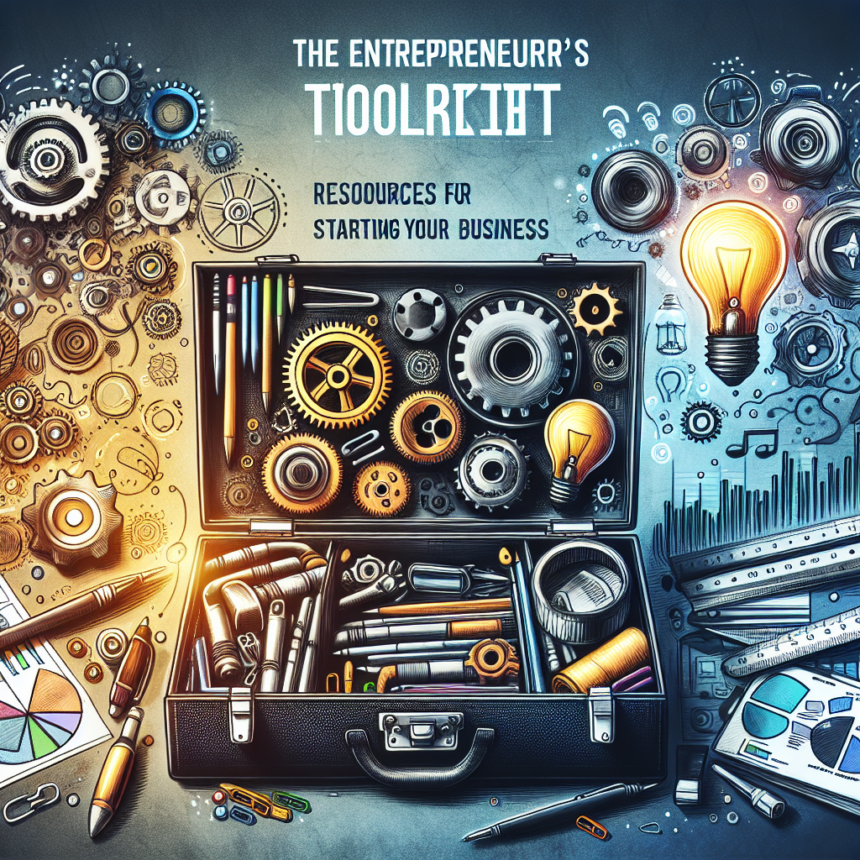Embarking on the entrepreneurial journey is as exhilarating as it is daunting. Artists of innovation and ambition, entrepreneurs must navigate a labyrinth of challenges, from ideation to execution. However, with the right tools and resources, launching a successful business becomes significantly more manageable. Here’s a comprehensive overview of the essential resources in The Entrepreneur’s Toolkit.
1. Business Plan Templates and Software
A solid business plan acts as a roadmap for your business, outlining your vision, target audience, competitive landscape, marketing strategies, financial projections, and long-term objectives. Various platforms, such as LivePlan and Bizplan, offer user-friendly templates and step-by-step guidance, enabling you to craft a professional business plan that communicates your ideas effectively to investors, partners, and stakeholders.
2. Market Research Tools
Understanding your market is vital for success. Utilizing resources like SurveyMonkey and Google Trends can provide valuable insights into consumer preferences and industry trends. Moreover, databases like Statista and Nielsen allow entrepreneurs to access comprehensive market research reports, ensuring that you make informed decisions based on accurate data.
3. Legal Resources
Navigating the legal landscape is crucial to establishing a business. Websites like LegalZoom and Rocket Lawyer can help you with business registration, trademark applications, and contract creation at a fraction of the cost of hiring a lawyer. Additionally, familiarize yourself with the Small Business Administration (SBA), which offers a wealth of resources on compliance, permits, and licenses that may apply to your business.
4. Financial Tools
Managing your finances is fundamental to sustainable growth. Accounting software, such as QuickBooks or FreshBooks, simplifies tracking your income and expenses and generating financial reports. Furthermore, cloud-based budgeting tools like Mint or YNAB (You Need a Budget) can help you establish financial goals and keep your spending in line.
5. Funding Resources
Whether seeking investors or applying for small business loans, having a clear understanding of your funding options is crucial. Platforms like Kickstarter and Indiegogo enable entrepreneurs to launch crowdfunding campaigns to gather resources directly from consumers. Alternatively, websites such as Fundera and Lendio provide valuable information on loans tailored to small businesses.
6. Networking and Mentorship
Connecting with seasoned entrepreneurs can provide invaluable insights and resources. Platforms like Meetup and LinkedIn can help you discover local networking events, industry conferences, and online groups dedicated to specific sectors. Additionally, SCORE offers free mentoring from experienced business professionals, offering strategic advice and guidance tailored to your needs.
7. Marketing Resources
Harnessing the power of marketing is essential to gain visibility. Digital marketing tools such as Mailchimp for email marketing, Hootsuite for social media management, and Canva for creating stunning graphics can enhance your marketing efforts. Additionally, the HubSpot Academy and Google’s Digital Garage offer free courses in marketing strategies, helping improve your knowledge and skills.
8. E-commerce Platforms
For businesses venturing into online sales, e-commerce platforms like Shopify, WooCommerce, or BigCommerce offer user-friendly solutions to create and manage online stores. These platforms typically include payment integration, inventory management, and marketing tools to help you launch and scale effectively.
9. Productivity Tools
Time management is critical for entrepreneurs juggling multiple responsibilities. Tools such as Trello, Slack, and Asana help streamline project management and enhance communication among team members. Employing these tools allows you to organize tasks efficiently and collaborate effectively with your team.
10. Continued Learning
As the business landscape evolves, ongoing education is imperative for success. Websites like Coursera, Udemy, and LinkedIn Learning provide countless courses on entrepreneurship, finance, marketing, and industry-specific skills. Allocating time for continued learning can keep your knowledge fresh and elevate your business acumen.
FAQs
Q: What is the first step I should take when starting a business?
A: Conduct thorough market research to understand your target audience and competitors. This foundational knowledge will guide your business plan and strategy.
Q: Do I need a business plan?
A: While not strictly necessary, a well-structured business plan helps clarify your vision and is often required when seeking funding.
Q: How can I secure funding for my business?
A: There are several avenues for funding, including personal savings, bank loans, crowdfunding, and angel investors. Consider which option aligns best with your business model.
Q: How important is networking for entrepreneurs?
A: Networking plays a crucial role in entrepreneurship. It opens doors to mentorship, partnerships, and potential customers, significantly impacting your business’s growth.
Q: What resources are available for ongoing business education?
A: Numerous online platforms, including Coursera, Udemy, and LinkedIn Learning, offer courses tailored to entrepreneurs looking to enhance their skills and knowledge.
Starting a business requires dedication, hard work, and a strategic approach. By leveraging these resources from The Entrepreneur’s Toolkit, you’ll be better equipped to navigate the challenges of entrepreneurship and pave the way towards success.
